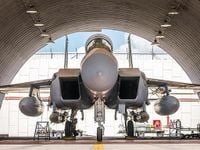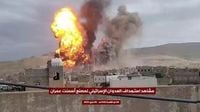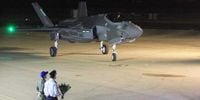Israeli Air Force planes executed a significant operation on May 8, 2025, targeting the Houthi regime in Yemen. This military action was a direct response to a Houthi rocket attack on Ben Gurion Airport, which prompted Israel to abandon its previous policy of restraint. The operation involved striking ten key targets, including the Sanaa international airport, which was completely rendered inoperable.
According to reports from the Israel Defense Forces (IDF), the airstrikes utilized 50 munitions to hit various facilities associated with the Houthi terrorist group, also known as Ansar Allah. The targets included the passenger terminal, runways, and fuel reserves at the airport, as well as a concrete plant and power plants. The IDF released an infographic detailing the operation, which showcased the extensive damage inflicted on these strategic locations.
In the aftermath of the airstrikes, Yemeni sources estimated the damage at around $500 million, highlighting the scale of destruction. The IDF's operational graphics and video footage of the air operations were also shared, further illustrating the military's capabilities and the nature of the strikes.
The air raid was executed with remarkable precision, involving coordination among various squadrons equipped with advanced fighter jets, including F-15s, F-16s, and F-35s, as well as aerial refueling and reconnaissance aircraft. Major N., the deputy commander of the 69th Air Force squadron, stated, "Conditions were created that allowed us to strike at a significant distance from the borders." He emphasized the importance of meticulous planning and preparation, noting that the operation was executed just hours after receiving the order to prepare for an attack.
Major N. explained that typically, such operations require several days of preparation, but this time, the rapid response was facilitated by a pre-compiled target bank. "After the rocket fell in Ben Gurion, we received a phone order to get ready for an attack. It was challenging, but prior training and accumulated experience helped us manage the situation effectively," he said.
More than 50% of the participants in the operation were reservists, reflecting the IDF's reliance on trained personnel outside of regular duty. Despite the surrounding tensions and public discourse regarding the military's actions, Major N. noted that the atmosphere within the squadron remained focused and determined. "The noise around collective letters from pilots demanding to release conscripts even at the price of an indefinite cessation of the war did not affect our combat spirit. The attendance of reservists was 100%, and we are always ready to carry out any mission," he asserted.
Captain I., a 25-year-old pilot participating in his first mission targeting Yemen, echoed Major N.'s sentiments about the importance of synchronization during the operation. He remarked, "All our actions are perfectly synchronized. It’s necessary to ensure smooth connections with tanker aircraft and other squadrons during the mission." He further stressed how critical it was to maintain focus, particularly during long flights where every detail matters.
The context of the operation was heightened by the recent Houthi rocket attack, which had prompted a swift military response from Israel. The IDF's actions were coordinated with the United States, which underscored the geopolitical implications of the strikes. Following the airstrikes, Washington announced a ceasefire in Yemen, although the agreement did not involve Israel, and the Houthis continued to issue threats against the Jewish state.
As the situation in Yemen remains volatile, the IDF's air operations reflect a broader strategy to counteract threats posed by the Houthi regime. The military's capability to conduct long-range strikes demonstrates significant advancements in Israel's air force technology and operational readiness. Major N. noted that, "We know how to counter any threat in any direction, and we prepare for various scenarios through simulations and high-resolution intelligence data."
The recent operations in Yemen have drawn attention not only for their military implications but also for the humanitarian situation in the region. As the conflict continues, the impact of military actions on civilians and infrastructure remains a pressing concern for international observers.
In summary, the Israeli Air Force's recent strikes in Yemen mark a pivotal moment in the ongoing conflict, showcasing the military's responsiveness and strategic capabilities in the face of emerging threats. As tensions escalate, the international community watches closely, aware that each military action carries significant consequences for regional stability.



